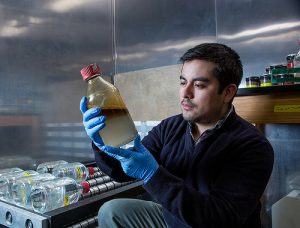Stories
Tito Peña Montenegro, 2016

The field of biology is currently facing dramatic changes with the advent of Big Data.
“We are facing the Big Data era in which we can read genomes -the total amount of DNA in a specified organism- in minutes,” says Tito Peña Montenegro, a doctoral student in Bioinformatics under major advisors Dr. Samantha Joye and Dr. Jonathan Arnold.
However, the amount of information available is beginning to surpass scientist’s processing and interpretation capabilities.
Montenegro, the recipient of a Fulbright awarded from the U.S. State Department and Colombia government’s Department of Science, Technology, and Innovation (COLCIENCIAS), develops ways to analyze metagenomic and metatranscriptomic datasets.
His research deals specifically with the microorganisms found in the water and sediments in the Gulf of Mexico.
“I study Bioinformatics to understand how some microorganisms are able to survive in extreme environments. By understanding this, my hope is to engineer biotechnology for efficient and safe bioremediation processes,” he explains.
He is specifically interested in using statistics, mathematics, and computing science tools to solve biological issues like water contamination in the Gulf.
“I study the impacts of the exposure of dispersants and oil on microbial samples from the Gulf of Mexico. Through tracking changes in DNA, RNA, and chemical profiles, we can follow the adaptation and responses of microbial communities.”
He also explores microbial ecology dynamics through the development of computing tools that interlink information provided by genomic data with geochemistry profiles.
“Our contributions can help to provide a deeper insight on the estimation of the microorganisms living at extreme conditions, how they are surviving, and their role in the environment,” he explains.
“This is a hot topic since we need to identify key drivers in the ocean to provide better advice regarding petrochemical procedures and to target quick restoration strategies in the event of an oil spill in the Gulf of Mexico or similar marine environments.”
Montenegro eventually plans to return to his home country of Colombia to continue his career in utilizing bioinformatics to solve environmental problems.
“One of my missions as a Fulbrighter is to share my experiences and knowledge with my home country. Once I finish my doctoral studies, I would like to go back to Colombia to support research projects focused on the intersection microbiology and environmental sciences through the application of Bioinformatics.”
Colombia is listed as one of the world’s “mega-diverse” countries, hosting close to 10 percent of the planet’s biodiversity. Worldwide, it ranks first in bird and orchid species diversity and second in plants, butterflies, freshwater fishes, and amphibians.
“With 314 types of ecosystems, my dream is to return to Colombia and develop a unified effort between academia, industry, and the government to track ecosystems under environmental risk, promote the application of bioremediation, and analyze new microorganisms from those environments.”
Montenegro also plans to lay the foundation for joint collaborations among communities under special social economic vulnerability conditions.
“I would like to apply and share my knowledge in environmental microbiology and bioinformatics to empower communities in bioremediation and conservation projects. Profound social and political changes are undergoing in my country, so I would like to mentor talented youth to provide them with better access to education in environmental and biological sciences. We need a new generation of leaders and scientists conscious of our impacts in the global climate.”
Feature article courtesy of The Graduate School | University of Georgia
